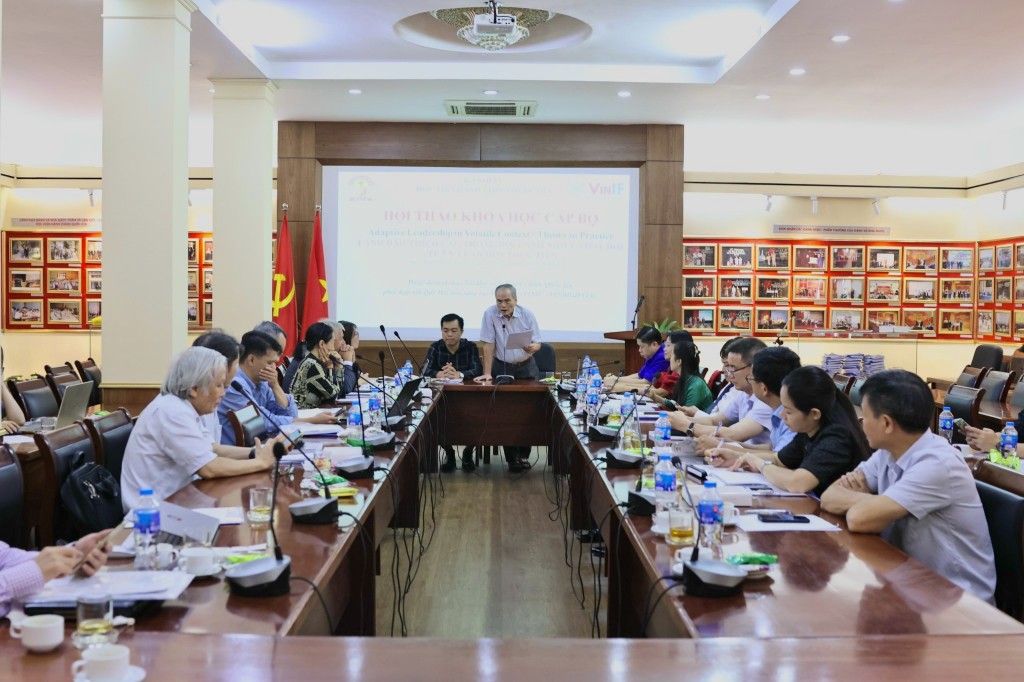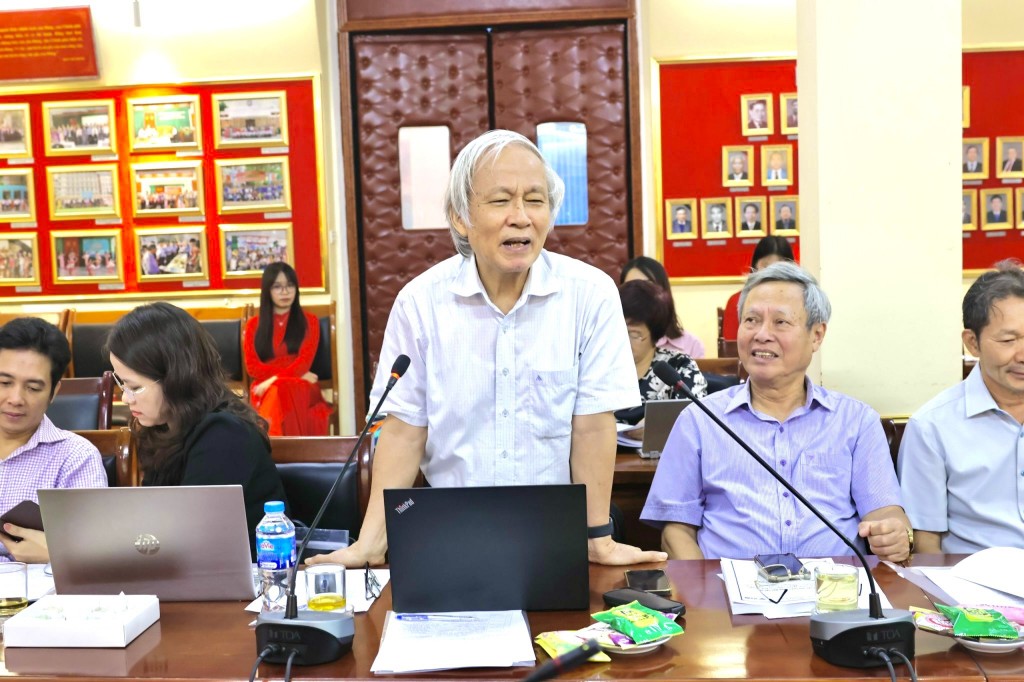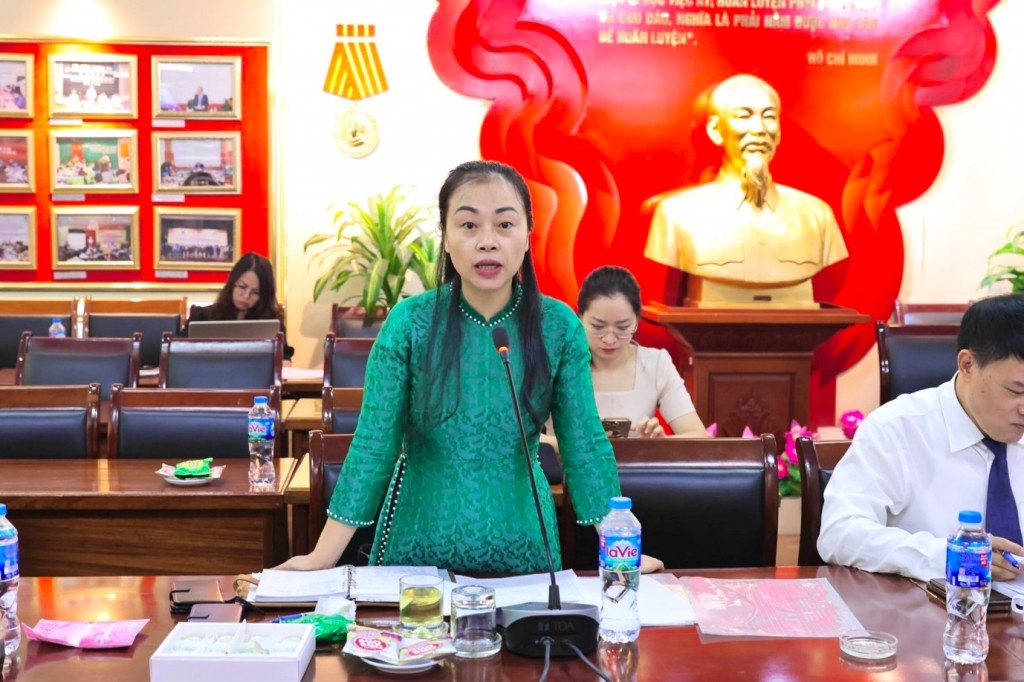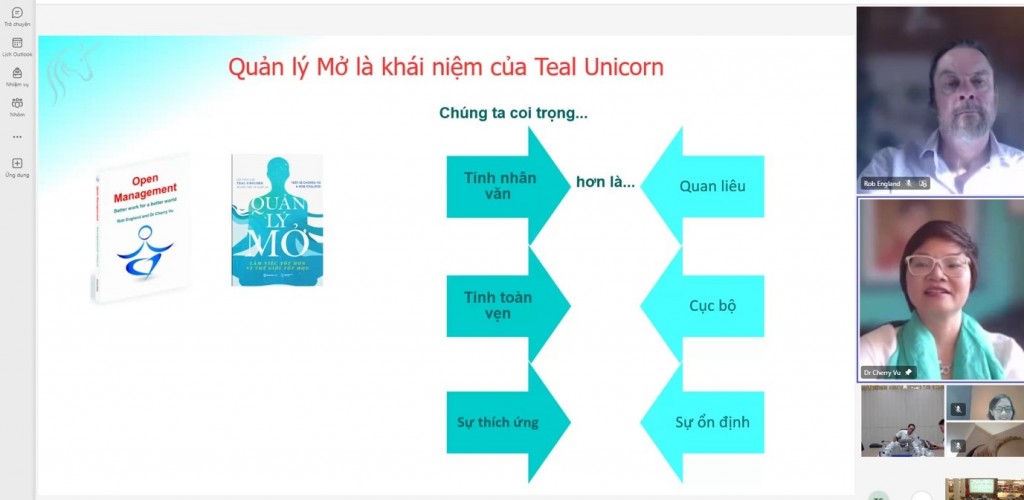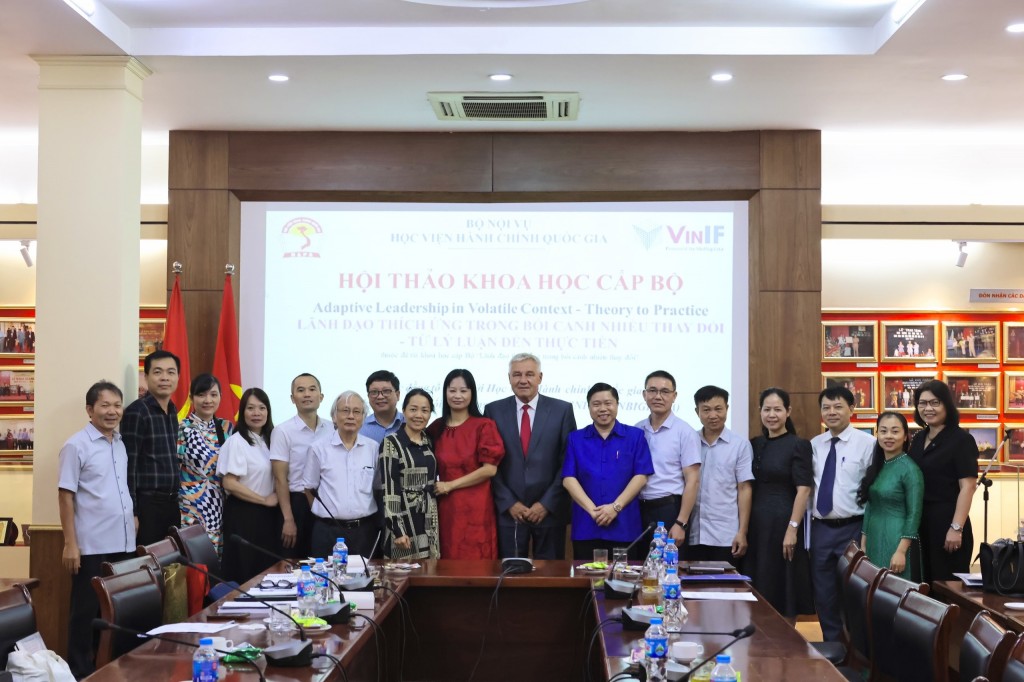On July 25, 2024, the National Academy of Public Administration (NAPA), in collaboration with the Vingroup Innovation Foundation (VINIF – VINBIGDATA), organized a ministerial-level workshop on the topic “Adaptive Leadership in Volatile Context – Theory to Practice.” This is part of the ministerial-level project “Adaptive Leadership in Volatile Context.”
The workshop was co-chaired by Prof. Dr. Nguyen Huu Khien, former NAPA Vice President, Ministry of Home Affairs (MoHA), and Assoc. Prof. Dr. Nguyen Van Chieu, Dean of the Faculty of Political Science, University of Social Sciences and Humanities, Viet Nam National University, Ha Noi.
The workshop was held both in-person and online, connecting with various ministries, sectors, and localities across the country, and the NAPA campuses.
International guests included Assoc. Prof Dr. Vu Minh Khuong from the Lee Kuan Yew School of Public Policy, Singapore; Mr. Wojtek Krupnik, representative of Gotia Company, Republic of Poland, and Director of the GWT Vocational Development Project in Viet Nam; Mr. Rob England & Dr. Cherry Vu, CEOs of Teal Unicorn.
From ministries, sectors, central and local agencies, participants included Ms. Bui Tu Oanh from the Department of Planning and Finance, the National Assembly Office; Ms. Tran Thi Thai, Deputy Chief of the MoHA Office; Dr. Vu Xuan Thanh, Deputy Director of the Institute for State Organizational Sciences, MoHA; Mr. Ta Tan, Deputy General Director of the Department of Non-Governmental Organizations, MoHA; Dr. Nguyen Ngoc Van, former Director of the Institute for State Organizational Sciences, MoHA; Dr. Duong Quang Tung, former Deputy Director of the Institute for State Organizational Sciences, MoHA; Ms. Nguyen Thi Hong Vinh, Deputy Head of the Division of Records, Archives, and Control of Administrative Procedure, MoHA; Mr. Nguyen Thanh Tung, Deputy Director of the National Architecture Institute, Ministry of Construction; Mr. Nguyen Quoc Hoang, Head of Division, National Architecture Institute, Ministry of Construction; Ms. Dao Thi Hanh from the Teachers and Educational Managers Department, Ministry of Education and Training; Ms. Ngo Thi Thanh from the Viet Nam General Confederation of Labor; Mr. Nguyen Duong Anh, Deputy Director of the Department of Information and Communications, Thua Thien Hue province…
Representatives from major academies and universities across the country included Dr. Nguyen Van Dang from the Institute of Sociology and Development, Ho Chi Minh National Academy of Politics; Dr. Pham Manh Hung from the Center for Business Administration Research, University of Economics and Business, Viet Nam National University, Ha Noi; Dr. Nguyen Van Dan from the Academy of Finance; Dr. Nguyen Hoang Nhi from the Institute of Southeast Asian Studies, Viet Nam Academy of Social Sciences; and Dr. Dinh Quang Thanh, Deputy Editor-in-Chief of the Political Theory Journal, Ho Chi Minh National Academy of Politics.
Representatives from enterprises and economic groups included Ms. Duong Thi Thu Ha, Deputy General Director of COMA18 Group Joint Stock Company; Ms. Pham Thi Thu Giang, Director of ALA Human Resource Development and International Cooperation Joint Stock Company.
From NAPA, there were Assoc. Prof. Dr. Nguyen Van Hau, Chief of the Office of NAPA; Assoc. Prof .Dr. Vo Kim Son, former senior lecturer; Dr. Vu Duy Duan, Director of the Department of Planning and Finance; Dr. Tong Dang Hung, Deputy Director of the Department of Refresher Training Management; Dr. Vu Cam Tu, Deputy Director of the Department of Refresher Training Management; Dr. Tran Thi Lan Anh, Deputy Director of the Department of International Cooperation; Dr. Nguyen Minh San, Deputy Director of the Institute of Administrative Studies; Dr. Ta Thi Huong, Deputy Dean of the Faculty of Social Management; Dr. Pham Quang Quyen, Head of the Library, NAPA; and Dr. Le Van Khai, Head of the Studies and Research Management Division, Institute of Administrative Studies.
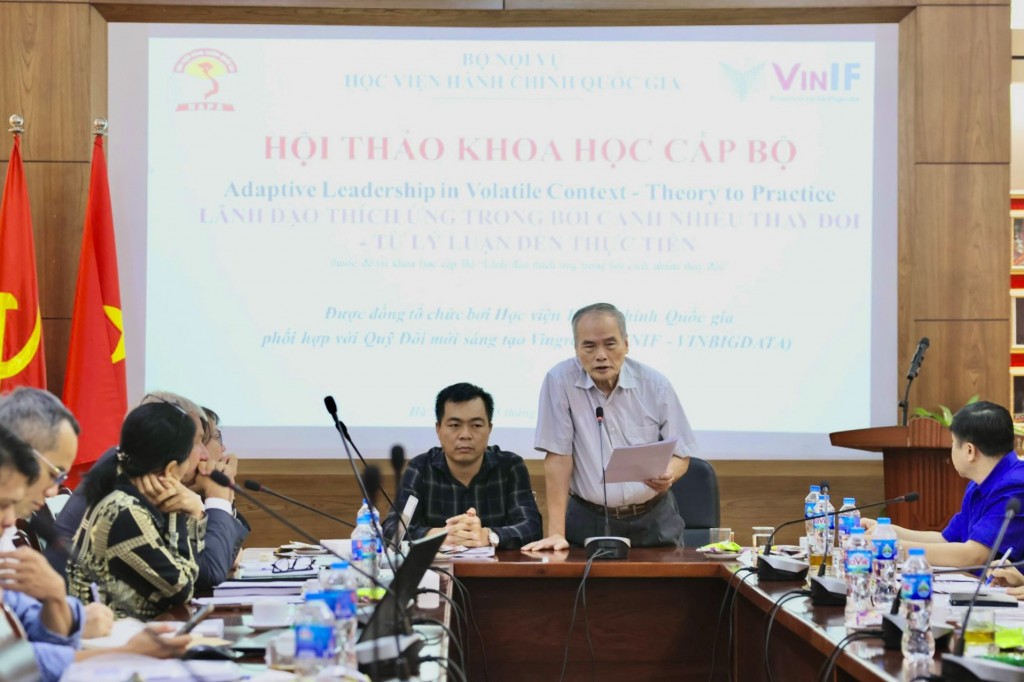
Prof. Dr. Nguyen Huu Khien, former NAPA Vice President, MoHA and Assoc. Prof. Dr. Nguyen Van Chieu, Dean of the Faculty of Political Science, University of Social Sciences and Humanities, Viet Nam National University, Ha Noi, co-chairing the workshop.
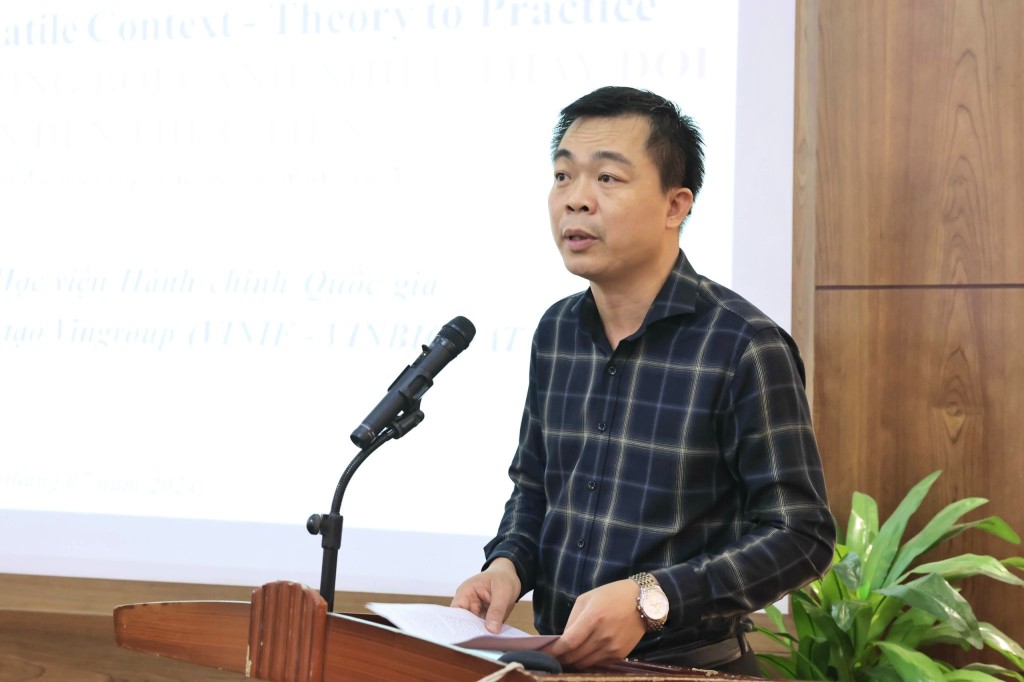
Assoc. Prof. Dr. Nguyen Van Chieu, Dean of the Faculty of Political Science, University of Social Sciences and Humanities, Viet Nam National University, Ha Noi, at the workshop.
In his keynote speech at the workshop, Assoc. Prof. Dr. Nguyen Van Chieu emphasized that “adaptive leadership” is the ability to quickly understand the environment, adapt, and create innovative solutions for new challenges (Torres, Reeves, and Love, 2012, Own the Future: 50 Ways to Win). It emphasizes flexibility, a willingness to take risks, and a capacity for continuous learning. Adaptive leadership also refers to a leader’s ability to adjust to change and uncertainty in a volatile context. It highlights the crucial role of adaptive leadership in helping organizations swiftly adapt to changes in industry, technology, markets, and organizational culture and provides fundamental principles and strategies to become an effective adaptive leader. Organizations are facing rapid changes and uncertainty with increasing pressure, especially in the current period. The Covid-19 crisis has shown that government agencies, individuals, and organizations need to address uncertainties and find experimental solutions to adapt to new, more demanding environments. The economic downturn and the ability to lead in a challenging pandemic environment have eroded trust among some citizens, businesses, and partners both domestically and internationally in the fields of production, business, and long-term cooperation. Furthermore, the development of science and technology, especially during the Fourth Industrial Revolution, has made the world more interconnected. Multimedia communication channels and information technology have bridged spatial gaps, providing organizations with advantages in scale and flexibility. Competition and conflicts over power, interests, and strategic positions between countries and regions are increasing, leading to alliances and an arms race. This creates instability and significantly impacts the security and socio-economic development of nations and organizations. The transfer of experience is disrupted by the development of information technology and the generational clash within society, creating a general crisis. The new workforce generations, such as Millennials and Gen Z, demand more flexible, diverse, and dynamic work environments. This requires organizations to adjust their work methods, embrace adaptive leadership, and seek sustainable solutions. Addressing these challenges requires leaders to enhance strategic thinking, transparency, and quick adaptability within the organization. Viet Nam is undergoing rapid development with many achievements and intertwined adaptive challenges that central and local agencies and organizations are facing. Adaptive leadership plays an important role in guiding and motivating sustainable development and competition.
As part of NAPA’s development strategy, aimed at enhancing training quality and building and promoting NAPA’s position, image, and brand, NAPA, in collaboration with VINIF – VINBIGDATA, organized the workshop ” Adaptive Leadership in Volatile Context – Theory to Practice”. This workshop is part of the ministerial-level project “Adaptive Leadership in Volatile Context.” The workshop aims to provide arguments on adaptive leadership in today’s volatile context and discuss its practical application in Viet Nam. This academic forum gathers the opinions of experts, scholars, managers, agencies, organizations, businesses, and stakeholders on the theory and practice of adaptive leadership in a volatile context. Based on this, it proposes effective adaptive leadership solutions for agencies and organizations in Viet Nam in the context of international integration and the rapidly developing Fourth Industrial Revolution.
Through the workshop, the organizers aimed to enhance information exchange among experts, scientists, managers, agencies, organizations, businesses, and other stakeholders on issues related to adaptive leadership in a volatile context, focusing on the following topics:
- The role of adaptive leadership in a volatile context
- Characteristics of adaptive leadership in a volatile context
- Factors influencing adaptive leadership in a volatile context
- Experiences of adaptive leadership in a volatile context in various countries around the world and implications for Viet Nam
- The impact of a volatile context on adaptive leadership in organizations in Viet Nam
- The current state of meeting the requirements of adaptive leadership in a volatile context in Viet Nam’s public administration agencies
- Issues raised for effectively applying adaptive leadership in organizations in Viet Nam
The workshop attracted the interest of a wide range of experts, scientists, managers, organizations, businesses, and economic groups, receiving nearly 40 academic papers. The organizers selected 14 high-quality papers for publication in the workshop proceedings.
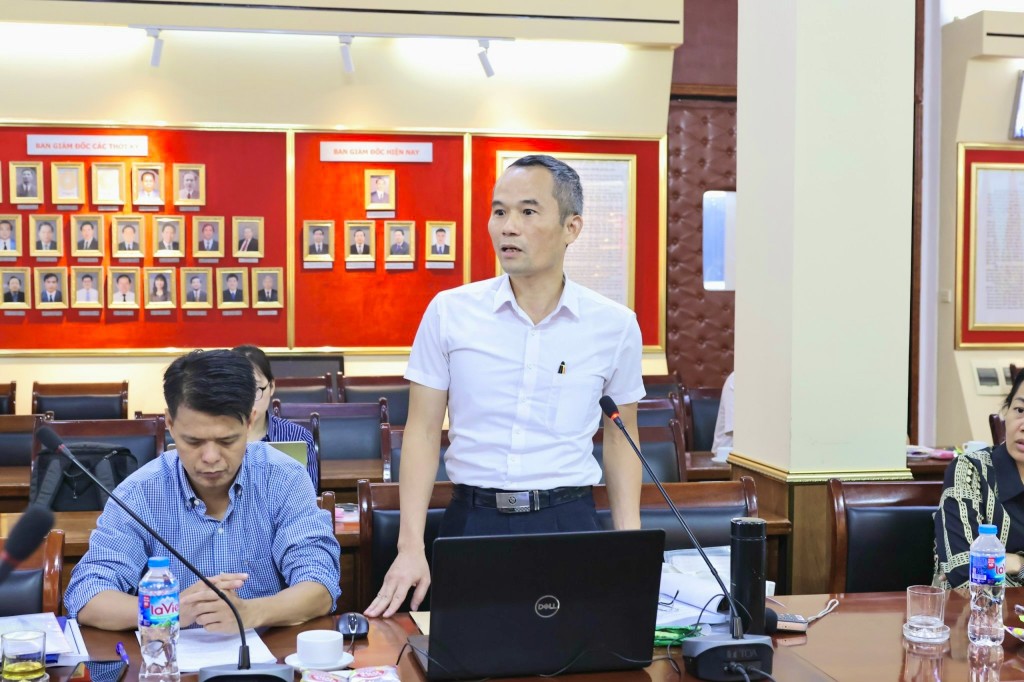
Dr. Pham Manh Hung from the Center for Business Administration Research, University of Economics and Business, Viet Nam National University, Ha Noi, at the workshop.
In his presentation, Dr. Pham Manh Hung highlighted policy solutions for building digital leadership capacity in the public sector from Singapore’s perspective. He emphasized that it is time for Viet Nam to clearly demonstrate strategic vision, serious commitment, and specific policies and programs to establish a leading digital position in the public sector to promote digital transformation. Viet Nam should implement specialized programs for senior officials focusing on digital leadership, ensuring that senior leaders possess the necessary skills and knowledge to drive digital transformation in the public sector. This includes developing a core team of digital leaders with innovative and strategic thinking, capable of connecting and leveraging global knowledge to maximize the use of advanced technology and innovation. This approach can help address major issues in Viet Nam and the world, gaining an advantage in this fierce competition. Additionally, Viet Nam should implement specific policies and programs to equip public officials with appropriate digital skills to adapt to digital transformation in the public sector, thereby promoting digital transformation.
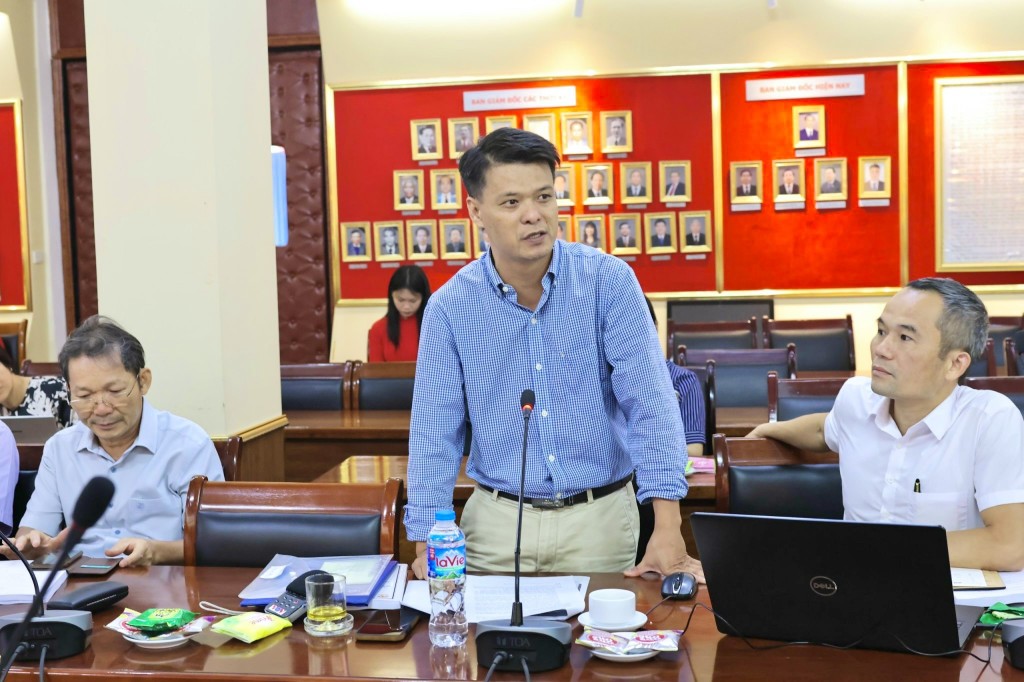
Dr. Nguyen Van Dang from the Institute of Sociology and Development, Ho Chi Minh National Academy of Politics, at the workshop.
In his presentation on “Adaptive Leadership: Theoretical Aspects and International Experiences,” Dr. Nguyen Van Dang from the Institute of Sociology and Development, Ho Chi Minh National Academy of Politics, pointed out that realizing the aspiration for a developed Viet Nam in the next 25 years requires not only the efforts and determination of the leaders and government apparatus but also the collaboration of all social classes, including private and social entities. Therefore, aiming to build a “modern and effective national governance system,” as outlined in the 13th National Party Congress’s documents, is a sound strategy. Emphasizing the multi-stakeholder, multi-center, and multi-level nature of governance, which values cooperation among various stakeholders—public and private, domestic and international—governance thinking is a theoretical approach that aligns with the contemporary world’s trends. This governance mindset, alongside the governmental system and market forces, provides national leaders with a multi-stakeholder network to mobilize the contributions of all social forces toward development goals.
Sharing his views at the workshop, Assoc. Prof. Dr. Vo Kim Son affirmed that the choice of leadership style in the public sector is constrained by many factors. One key factor is the principle of “only doing what the law prescribes.” Deviation from the democratic centralism style in organizational management can lead to “sanctions.” The choice of leadership style in the public sector is thus limited. Therefore, it is necessary to have a high level of legal authority granting each manager the right to decide what style to apply in different contexts. As organizations, including state administrative organizations, exist, operate, and develop in an ever-changing VUCA environment (Volatility, Uncertainty, Complexity, Ambiguity), granting the choice of an adaptive, suitable leadership style should be the foundational philosophy for enhancing leadership and management capabilities. However, legal and political barriers will certainly narrow the space for choosing and applying adaptive leadership styles.
At the workshop, Ms. Duong Thi Thu Ha, Deputy General Director of COMA18, discussed the constantly changing socio-economic context both globally and domestically, describing it as a challenge not only for each country, organization, and business but also for every individual. Today’s leaders must not only “steer and guide” their teams, organizations, and businesses with personal capability and will but also coordinate and leverage the abilities of their subordinates to achieve goals and continuously restructure the business. The turbulent social context forces businesses to constantly change and adjust their development and business strategies, as well as modify working methods to improve efficiency. Changes in customers, products, staff, and resources demand adaptive leadership skills to survive and thrive. There are two types of adaptation: proactive and reactive, also known as “self-adaptation” and “forced adaptation.” Accordingly, there are two groups of adaptive leaders, leading to businesses being either proactive in creating breakthroughs and rising or having to adapt to survive.
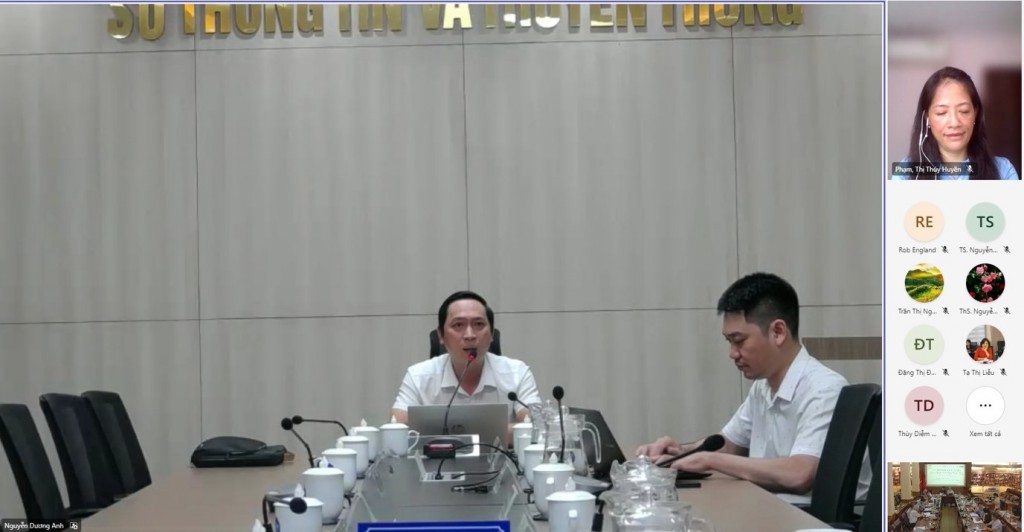
Mr. Nguyen Duong Anh, Deputy Director of the Department of Information and Communications, Thua Thien Hue province, at the workshop.
Mr. Rob England and Ms. Cherry Vu presented proposals on open management and adaptive leadership in Viet Nam, emphasizing global thinking in organizational transformation, open management, and training and coaching for leaders and managers. They highlighted the necessity of changing leadership and management thinking, especially in the current context of rapid and continuous change. To survive and thrive, leaders must adapt to new ways of thinking, working, and leading organizations. Open management fosters better adaptation, leading to better outcomes, improved lives, and a better society.
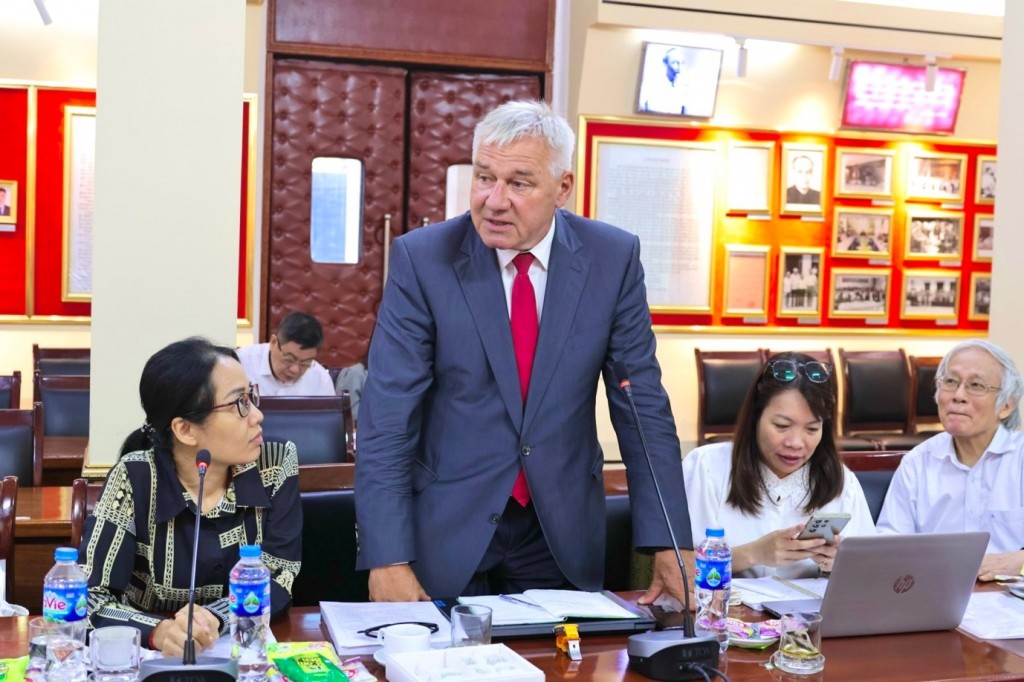
Mr. Wojtek Krupnik, representative of Gotia Company, Republic of Poland, and Director of the GWT Vocational Development Project in Viet Nam, at the workshop.
Mr. Wojtek Krupnik emphasized that organizations are facing rapid and uncertain changes with increasing pressure, particularly in the current era. Addressing these challenges requires leaders to enhance their strategic thinking, transparency, and quick adaptability within the organization. Viet Nam is experiencing strong development, marked by achievements and adaptive challenges at both central and local levels. Adaptive leadership plays a crucial role in guiding and motivating sustainable development and competition.
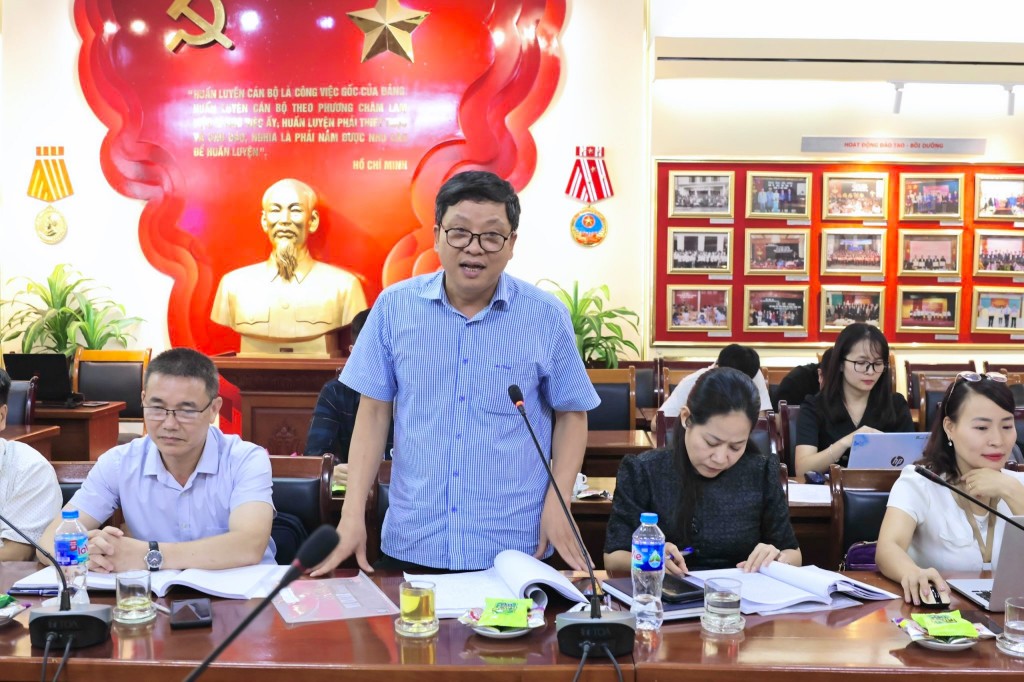
Mr. Ta Tan, Deputy General Director of the Department of Non-Governmental Organizations, MoHA, at the workshop.
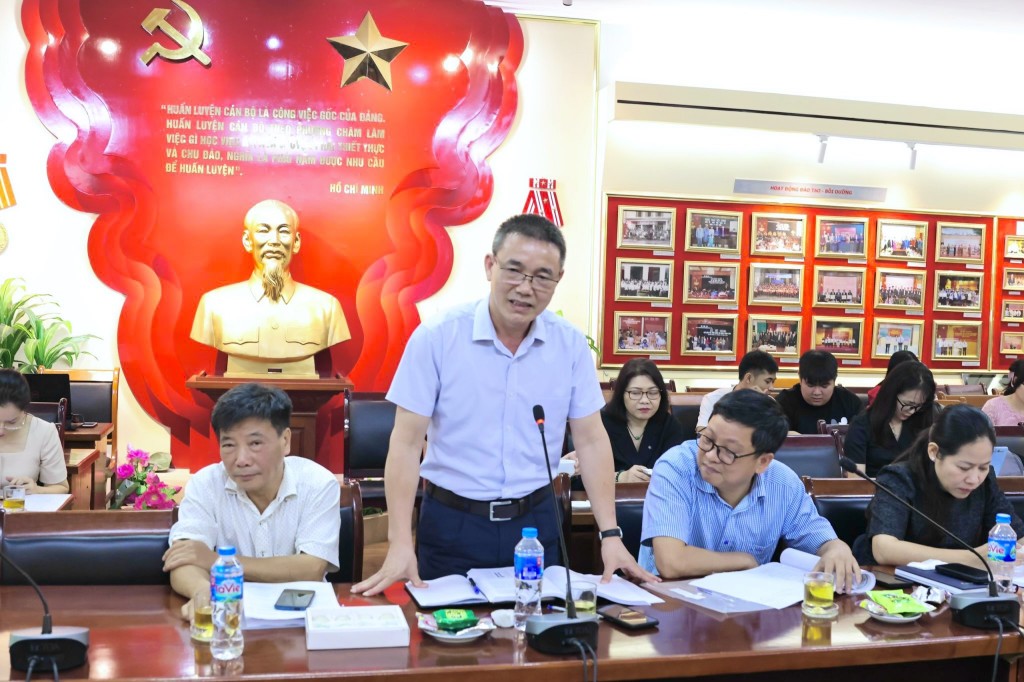
Dr. Vu Xuan Thanh, Deputy Director of the Institute for State Organizational Sciences, MoHA, at the workshop.
In his closing remarks, Assoc. Prof. Dr. Nguyen Van Hau expressed gratitude to the ministries, central and local agencies, provinces/cities, partner units, experts, and scientists who supported and contributed to the success of the workshop. NAPA looks forward to continued interest, support from higher authorities, and collaboration with esteemed agencies, experts, and scientists as NAPA continues its development and integration journey.


